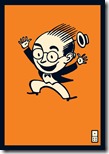 A year ago, marketing guru Seth Godin announced he would never publish a book “traditionally” again, and launched the Domino Project, an Amazon e- and print publishing imprint through which he intended to “make ideas easier to spread” and experiment with thinking outside the box in the way e-books are formatted and sold. (For example, his first book had no text on the cover, since you’d be seeing that on the Amazon page when you ordered it.)
A year ago, marketing guru Seth Godin announced he would never publish a book “traditionally” again, and launched the Domino Project, an Amazon e- and print publishing imprint through which he intended to “make ideas easier to spread” and experiment with thinking outside the box in the way e-books are formatted and sold. (For example, his first book had no text on the cover, since you’d be seeing that on the Amazon page when you ordered it.)
He continued to experiment with innovative ways of promoting the books. For example, one Domino Project book came with a code good for downloading 200 free songs from indie musicians hand-selected by the author of the book.
Now Godin is declaring victory and ending the project after 12 months and 12 books. He writes on his blog:
By most of the measures I set out at the beginning, the project has been a success. So why stop? Mostly because it was a project, not a lifelong commitment to being a publisher of books. Projects are fun to start, but part of the deal is that they don’t last forever.
Godin lays out a series of lessons he has learned from the project: for example:
The ebook is a change agent like none the book business has ever seen. It cuts the publishing time cycle by 90%, lowers costs, lowers revenue and creates both a long tail and an impulse-buying opportunity. This is the most disruptive thing to happen to books in four hundred years. It’s hard for me to see significant ways traditional book publishers can add the value they’re used to adding when it comes to marketing ebooks, unless they get busy with #1 [convincing would-be buyers to give them permission to sell].
He notes that, in a world of so many books and publishers (and e-books and e-publishers), it can be hard for individual publishers to stand out above the crowd, but that a market for collectible editions of print books can help publishers find a way to distinguish themselves. Sponsored e-books can be another such method, because readers, sponsors, and authors find them “economically irresistible.”
Godin doesn’t plan to stop writing and publishing himself, but he’s bringing the Domino Project to an end though titles published through it will remain available for sale.
In the end, Godin seems to have learned some interesting lessons from the venture, and perhaps those lessons will prove useful to other publishers looking for ways to stand out from the crowd.
I wonder what Seth Godin will try next? There’s one thing for sure about the man—he seems to have a never-ending supply of ideas, and a lot of them seem to have worked out pretty well for him so far.
(Found via GalleyCat.)
































